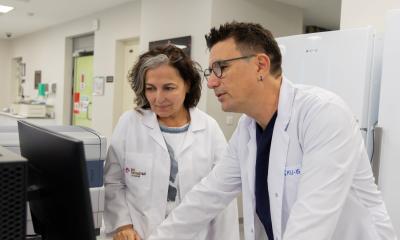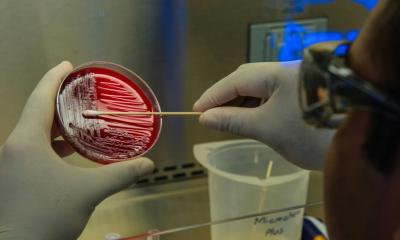DNA sequencing tackles MRSA outbreak
‘This is a dramatic demonstration that medical genomics is no longer a technology of the future – it is a technology of the here and now' Report: Mark Nicholls

Researchers have used genome sequencing to control an MRSA outbreak in a British hospital, and scientists from the University of Cambridge, the Wellcome Trust Sanger Institute and Cambridge University Hospitals believe the breakthrough could impact significantly on the way hospitals tackle the commonly termed ‘superbug’ threat in the future.
The team used advanced DNA sequencing technologies to confirm the presence of an on-going outbreak of methicillin-resistant Staphylococcus aureus (MRSA) in real time in a Special Care Baby Unit. By cracking the bacterium’s genetic code, they were able to end the outbreak at the Rosie Hospital in Cambridge – and devise a new weapon in the continuing MRSA problem.
Identifying the carrier
Hospital staff became concerned after MRSA was detected in 12 babies during routine screening, but current tests could not tell if this represented a single on-going outbreak within the unit or whether these were unrelated cases.
The research team stepped in and, by comparing MRSA isolates from those 12 patients using DNA sequencing technology, they showed the pathogens were all closely related and part of the same outbreak.
The ward was deep cleaned, but when another MRSA positive infant was detected after an MRSA-free gap of two months, the team used advanced DNA sequencing to show in real time that this strain was also part of the outbreak, despite the lack of apparent links between this case and previous patients. The finding presented the possibility that a member of staff was carrying the MRSA strain.
Tests on 154 members of staff showed that one person was also carrying MRSA, which may have been the source for at least some babies in the unit. The healthcare worker was treated to eradicate the MRSA presence and thus remove the risk of further spread.
Essential distinguishing between the strains
This is believed to be the first time rapid genetic testing has been used to track and stop an outbreak, but the technique could soon become a regular way of stopping MRSA.
Professor Sharon Peacock from the University of Cambridge, said that current bacterial typing techniques lacked sufficient discrimination to distinguish between strains of MRSA that are most often isolated in hospitals. ‘In the event that two patients are either carrying or infected with a strain such as EMRSA-15 – the most common clone in the UK – it isn’t possible to distinguish with any confidence whether there has been a transmission event from one patient to another, or whether both patients acquired their MRSA through independent acquisition events. So, a driver for evaluating whole genome sequencing of MRSA was to see whether this provided enough discrimination to tell apart strains of the same lineage.’
This was achieved by undertaking whole genome sequencing using a rapid high throughput bench-top sequencer, but the investigations took a decisive turn and became a real-time prospective study as the outbreak unfolded at the Rosie Hospital.
‘What we also wanted to achieve was to start the process of translating the technology from being a research tool where timing does not matter, to a real-time clinical tool – so we were using machines that could be used in the future in clinical practice,’ she explained, adding that the next step is to devise simple- to-use automated interpretation tools that will enable hospitals to analyse complicated sequence data.
‘Our study indicates the considerable potential of sequencing for the rapid identification of MRSA outbreaks. If we have a robust system of this type available for routine use in the future,’ Prof. Peacock pointed out, ‘we could use it to investigate putative outbreaks at their outset and, if confirmed, put in place infection control measures that bring them to a rapid close.’
The team is also building a database of MRSA genomes with 2,000 already collected from across the UK, which will provide an essential genetic framework with which to compare and interpret MRSA genomes in the future.
Cleaning remains essential
The researchers are currently studying all MRSA carriers and infected patients over the next year from a number of East of England hospitals and the community to understand transmission events with the aim of improving infection control management.
‘In the future, sequencing will be used for infection control surveillance and outbreak investigation because it adds considerable value to the existing methods of infection control, and could act as an early warning system,’ Prof. Peacock predicted. She also stressed that conventional methods of combating MRSA, such as hand-washing, hospital cleaning and care of intravenous lines, remain essential for the on-going prevention of MRSA bloodstream infections, but the introduction of technology to crack the MRSA genetic code will add an extra weapon in the fight against the pathogen.
Sir Mark Walport, Director of the Wellcome Trust, said: ‘This is a dramatic demonstration that medical genomics is no longer a technology of the future – it is a technology of the here and now. By collaborating with NHS doctors, geneticists have shown that sequencing can have extremely important applications in healthcare today, halting an outbreak of a potentially deadly disease.’
Profile
Professor Sharon Peacock is Professor of Clinical Microbiology in the Department of Medicine at the University of Cambridge and an honorary consultant with Cambridge University Hospitals NHS Trust and for the Health Protection Agency. Her research focuses on the role of sequencing technologies in diagnostic microbiology and public health.
04.03.2013





